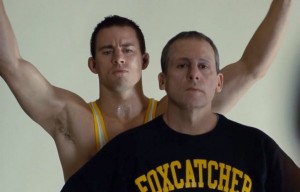How True Should a “Based on a True Story” Movie Be?
Posted on January 2, 2015 at 8:10 pm
What does “based on a true story” really mean? The Washington Post had a front-page story titled, “‘Selma’ sets off a controversy amid Oscar buzz,” describing the objections by Lyndon Johnson administration insiders to the way he was portrayed. They say it was his idea to go to Selma, that he supported Dr. King’s efforts, and that he had nothing to do with the FBI’s surveillance and J. Edgar Hoover’s sending tapes of King’s supposed affairs to Mrs. King.
Historian Michael Bechloss has posted this handwritten note made by King for his conversation with LBJ:
Martin Luther King handwritten note on keeping “national attention focused on Selma”: #KingCenter pic.twitter.com/VjQ9gBgzh0
— Michael Beschloss (@BeschlossDC) January 4, 2015
And now my friend Jen Yamoto is summarizing objections to “Selma” and to other “based on a true story” films “Foxcatcher,” “The Imitation Game,” “Unbroken,” and “Big Eyes.” Some of these are the concerns of those trying to make sure that those who take their “history” from Oscar-worthy feature films at least begin to question the capacity of any dramatic work to be accurate in conveying historical events. But some are just sniping by competitors in the Oscar race.
As Jen writes:
Oscar voting opened Monday, and like clockwork, the haters have come calling. As Deadline’s Pete Hammond wrote on Monday, ’tis the season for controversy over fact-based awards contenders: Now, Bennett Miller’s real-life Olympian tragedy Foxcatcher and Tim Burton’s art exposé Big Eyeshave joined MLK Jr. drama Selma, the Alan Turing biopic The Imitation Game and Angelina Jolie’s Unbroken in ducking for cover over accuracy issues in mixing fact-based stories with narrative structure.
Even the most scrupulous accuracy will still reflect choices of perspective, tone, and emphasis. The best we can hope from any work of art is that it is the beginning, not the end, of an inquiry into the subject.
The Guardian takes on the portrayal of Alan Turing in “The Imitation Game.”
Movie critic Ann Hornaday has an excellent piece on this subject in the Washington Post. She wisely concludes:
if the Gotcha Game is here to stay, we can at least agree on some new rules. And we can begin by adjusting our own attitudes toward fact-based films and their inevitable nit-pickers. Rather than the dualistic one’s-right-one’s-wrong model, it behooves audiences to cultivate a third eye — a new, more sophisticated way of appreciating both the art and the reality that inspires it.

